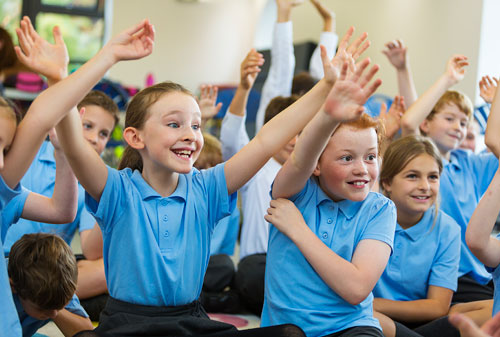




Social development involves the learning of skills and attitudes which allows individuals to live with other members of the community easily. It also increases the child's capacity to live independently in society.
Social development follows a similar pattern everywhere, although some countries have different social practices. From birth, a baby will be aware of people and will spend a great deal of time watching and copying.
During their social development a child will learn how to:
Examples of social skills:
Babies and children develop at a different rate but there are some common milestones in their social development.
By 12 months babies will be able to differentiate between members of the family and socialise with them. They will make specific sounds to draw attention and will offer a book or toy to adults.
Tantrums are common as children seek independence. They will participate in role play, copying what the adults around them are doing. They will also be interested in other children, but they will tend to play alongside them rather than with them.
Children will be happier separated from their parents playing with other children of the same age. They will be kind and caring with other children.
Children of this age are happy and curious, but they can also be selfish and argumentative. They can start to withdraw from the family as they develop their own identity. They are aware of their gender and prefer playing with children of the same gender.
Children become more independent and can become moody and need more privacy. Peer groups are important to children of this age and they can start to experiment with fashion in order to carve out their identity.
Generally, there are five stages in social play. They are known as solitary play, observational play, parallel play, associative play and co-operative play. Not all children will experience all five stages but any one of the stages can be relevant depending on their age, spirits, environment and the individuals around them. Gradually, children will learn with others and although the process can take time, eventually they will begin to play together. There might be periods where children will choose to play on their own (solitary play) even though they are able to play with others. (parallel, associative, co-operative).
Solitary play means that a child will choose to play on their own as they find it difficult to play with others, or on account of their stage of development. Babies and toddlers from the age of 6 months play alone as they need time and space to explore the environment and the equipment provided. When the child is participating in solitary play, it gives them space and time to think, understand and accept themselves. Although they are playing on their own, they often need comfort from others around them.
For a baby or a child to benefit from solitary play they will need interesting experiences and be comforted by others if they begin to feel frustrated. An older child will benefit from playing individually as they will have the opportunity to focus on practice and specific skills. It is important for the adult to protect the child’s toys and play area so that the child can enjoy the experience of playing alone, and to make sure that the child is not expected to share before they are ready to do that.
A baby of around 8 months will enjoy passively watching other children play without taking part themselves. This type of ‘watching’ can be found in older children who are new to the setting and not yet ready to join the play. This may also be found in a child who feels safe in a group but take a passive interest in a friend’s activity.
During this time children like to watch other children play, but not participate themselves. They are often seen standing or sitting close to other children who are playing. Children may look lonely or lack confidence as they watch other children play, but this is an important stage in their social development as they learn how to play through observation.
During this stage of play children become more aware of other children but may not yet be communicating or playing with each other. Children will play alongside but not together during this stage of their social development as they are fully immersed in their own activity. Parallel play is sometimes called side-by-side play, as children often like having the same toys but want their own play area. They may comment on what they are doing, or imitate another child, but they rarely interact. This period of social play occurs after solitary play observational play, when the child is not happy to play alone, but not yet ready to share toys or take turns. Children will often engage in parallel play when doing activities with sand, water, block and crafts. Older children also enjoy parallel play at times as they enjoy company and communication, but also need their own space.
The definition of associative play is when two or more children play together in a relaxed way. Associative play is when children will be playing the same game but won’t be working together directly. They will often share toys and watch and copy each other but might not be doing the same thing. For example, two children can be playing that they are “going shopping” but will be concentrating on their own “shopping list”. Associative play is sometime referred to as partnership working as children become more aware and involved in each other’s activities. During this stage of social development, language is extremely important as their imagination grows. Children who participate in associative play usually are more interested in exchanging material, rather than participating in a specific task.
Co-operative play is when two children or more are actively playing with each other. They will communicate with each other and decide together which game or activity they’d like to play. Children will become more sociable and share their toys as well become more aware of the needs of the children around them. Play can become more complicated with the introduction of playing “a part” such as a teacher and pupil for example. Being part of a group or working towards the same objective is important for children during this stage. By the age of 7, most children can play games with rules whilst also creating their own rules and “revisiting” games after a few days.
Datblygiad cymdeithasol yw’r broses o ddysgu’r sgiliau ac agweddau sy’n galluogi unigolion i fyw yn hawdd gydag aelodau eraill yn eu cymuned. Mae hefyd yn golygu cynnydd yng ngallu’r plentyn i fod yn annibynnol o fewn ei gymdeithas.
Mae datblygiad cymdeithasol yn dilyn patrwm tebyg ym mhob man, er bod rhai gwledydd yn dilyn arferion cymdeithasol gwahanol. O'r adeg y caiff babi ei eni, mae’n ymwybodol o bobl ac yn treulio llawer o amser yn eu gwylio ac yn eu copïo.
Wrth ddatblygu’n gymdeithasol bydd plentyn yn dysgu sut i:
Enghreifftiau o sgiliau cymdeithasol:
Mae babanod a phlant yn datblygu ar raddfa wahanol ond mae rhai cerrig milltir cyffredin yn eu datblygiad cymdeithasol.
Erbyn deuddeg mis bydd babanod yn gwahaniaethu rhwng aelodau o’r teulu ac yn cymdeithasu â nhw. Byddant yn gwneud synau penodol er mwyn denu sylw ac yn cynnig llyfr neu degan i oedolion, ac yn dilyn cyfarwyddiadau syml.
Mae strancio yn gyffredin wrth i blant bach geisio dod yn annibynnol. Byddant yn chwarae rôl, gan gopïo beth mae'r oedolion o'u cwmpas yn ei wneud. Bydd ganddynt ddiddordeb mewn plant eraill hefyd, ond byddant yn tueddu i chwarae ochr yn ochr â hwy yn hytrach na gyda nhw.
Bydd plant yn hapusach i wahanu oddi wrth riant gan chwarae gyda phlant eraill yn yr oed yma. Byddant yn garedig a gofalgar tuag at blant eraill, ond gallant wrthdaro â’u gofalwyr yn aml. Byddant yn dechrau dysgu pa fath o ymddygiad sy’n briodol ar gyfer gwahanol sefyllfaoedd cymdeithasol.
Mae plant yr oed yma yn hapus ac yn chwilfrydig, ond gallant hefyd fod yn hunanol a dadleuol. Maent yn dechrau deall a dilyn rheolau cymdeithasol. Gallant ddechrau tynnu'n ôl ychydig o'r teulu wrth iddynt ddatblygu eu hunaniaeth eu hunain. Maent yn ymwybodol o'u rhyw ac mae'n well ganddynt chwarae gyda phlant o'r un rhyw.
Mae'r plant yn dod yn fwy annibynnol a gallant ddod yn bwdlyd ac angen mwy o breifatrwydd. Mae grwpiau cyfoedion yn bwysig i blant yn yr oed yma a gallant ddechrau arbrofi gyda ffasiwn er mwyn canfod eu hunaniaeth.
Yn gyffredinol, gwelir bod pum cyfnod mewn chwarae cymdeithasol, sef chwarae unigol, chwarae gwylio, chwarae paralel, chwarae cysylltiadol, a chwarae cydweithredol. Nid yw pob plentyn yn mynd drwy'r pum cyfnod, ond gall unrhyw un o'r cyfnodau fod yn berthnasol yn dibynnu ar oed, hwyliau, yr amgylchedd, a’r unigolion sydd o gwmpas y plant. Yn raddol, bydd plant yn dechrau dysgu gydag eraill ac er fod y broses hon yn cymryd amser, byddant dros amser yn dechrau chwarae ar y cyd. Efallai bydd adegau pan fydd plant yn dewis chwarae ar eu pen eu hunain (chwarae unigol), er eu bod yn gallu chwarae gydag eraill (paralel, cysylltiadol, cydweithredol).
Mae chwarae unigol yn golygu y bydd plentyn yn chwarae ar ei ben ei hun o ddewis oherwydd ei fod yn ei chael hi'n anodd chwarae gydag eraill, neu oherwydd ei gyfnod datblygiad. Bydd babanod a phlant bach o chwe mis oed yn chwarae ar eu pen eu hunain gan fod arnynt angen amser a lle i archwilio'r amgylchedd a'r offer. Wrth chwarae'n unigol, mae'r plentyn hefyd yn cael lle ac amser i feddwl, deall a derbyn ei hun. Er bod y plant yn chwarae’n unigol bydd angen i eraill o'u cwmpas eu cysuro yn aml.
Er mwyn i fabi neu blentyn bach elwa o chwarae unigol bydd arnynt angen profiadau difyr a chymorth eraill pan fyddant yn dechrau teimlo'n rhwystredig gyda'r chwarae. Bydd plentyn hŷn yn elwa o chwarae'n unigol oherwydd caiff gyfle i ganolbwyntio ar sgiliau penodol a'u hymarfer. Mae'n bwysig i'r oedolyn amddiffyn teganau a lle chwarae'r plentyn fel bod y plentyn yn gallu mwynhau'r profiad o chwarae ar ei ben ei hun, a gofalu nad oes disgwyl i'r plentyn rannu cyn ei fod yn barod i wneud hynny.
Bydd babi tua 8 mis oed yn mwynhau gwylio ac edrych yn oddefol ar blant eraill yn chwarae, heb gymryd rhan yn y chwarae ei hun. Bydd y 'gwylio' hwn i'w weld mewn plentyn hŷn sy'n newydd yn y lleoliad ac heb fod yn barod eto i ymuno â'r chwarae. Ond, efallai bydd hyn hefyd i'w weld mewn plentyn sy'n teimlo'n ddiogel mewn grŵp, ond sy'n cymryd diddordeb goddefol mewn gweithgaredd ffrind.
Yn ystod y cyfnod hwn mae plant yn hoffi gwylio plant eraill yn chwarae, ond heb ymuno â’r chwarae. Yn aml fe’i gwelir yn sefyll neu eistedd yn agos at blant eraill sy’n chwarae. Efallai bydd plant yn edrych yn unig neu’n ddihyder wrth iddynt wylio plant eraill yn chwarae, ond mae hyn yn gyfnod pwysig yn eu datblygiad cymdeithasol gan eu bod yn dysgu sut i chwarae drwy arsylwi.
Daw plant yn fwy ymwybodol o blant eraill, ond efallai na fyddant yn cyfathrebu â'i gilydd nac yn chwarae gyda'i gilydd eto. Bydd plant yn chwarae wrth ochr ei gilydd, ond ar wahân i'w gilydd yn ystod y cyfnod hwn yn eu datblygiad cymdeithasol, gan ymgolli'n llwyr yn eu gweithgaredd eu hunain. Gelwir chwarae paralel weithiau yn chwarae ochr yn ochr, a bydd y plant yn aml yn hoffi cael yr un teganau ond eisiau lle chwarae eu hunain. Efallai byddant yn gwneud sylwadau ar yr hyn a wnânt, neu'n efelychu plentyn arall, ond anaml y byddant yn ymwneud a’i gilydd. Bydd y cyfnod hwn o chwarae cymdeithasol yn digwydd ar ôl chwarae unigol a chwarae drwy wylio eraill, pan na fydd y plentyn yn hapus i chwarae ar ei ben ei hun, ond heb fod eto'n barod i rannu teganau neu gymryd tro. Bydd plant yn chwarae'n baralel yn aml wrth wneud gweithgareddau gyda thywod, dŵr, blociau a chrefftau. Bydd plant hŷn hefyd yn mwynhau chwarae paralel ar adegau gan eu bod yn mwynhau cwmni a chyfathrebu, ond hefyd angen eu lle eu hunain.
Y diffiniad o chwarae cysylltiadol yw pan fydd dau blentyn neu fwy yn chwarae gyda'i gilydd mewn ffordd gymharol lac. Chwarae cysylltiadol yw pan fydd plant yn chwarae'r un gêm ond heb fod yn gweithio gyda'i gilydd nac yn ymwneud yn uniongyrchol â'i gilydd. Byddant yn aml yn rhannu teganau, yn gwylio ac yn copïo ei gilydd, ond efallai na fyddant yn gwneud yr un peth e.e. gall dau blentyn fod yn chwarae "mynd i siopa" gan ganolbwyntio ar eu "rhestr siopa" eu hunain. Weithiau, gelwir chwarae cysylltiadol yn chwarae partneriaeth a daw plant yn fwy ymwybodol ac yn ran o weithgareddau ei gilydd. Yn ystod y cyfnod hwn o ddatblygiad cymdeithasol, mae iaith y plant yn bwysig iawn ac mae eu dychymyg yn tyfu. Mae gan blant sy'n chwarae'n gysylltiadol yn aml fwy o ddiddordeb mewn chwarae gyda defnyddiau a'u cyfnewid, yn hytrach na gwneud unrhyw dasg benodol.
Chwarae cydweithredol yw pan fydd dau blentyn neu fwy yn cyd chwarae yn weithredol efo'i gilydd. Byddant yn rhannu'r chwarae, yn siarad â'i gilydd ac yn penderfynu efo'i gilydd pa gêm neu weithgaredd maent eisiau chwarae. Bydd plant yn fwy cymdeithasgar gan rannu tegannau ac yn ymwybodol o anghenion y plant eraill o'u cwmpas. Bydd y chwarae yn fwy cymhleth gan gynnwys chwarae "rhannau" e.e. athrawes a disgybl. Mae'r ymdeimlad o berthyn i grŵp a gweithio tuag at yr un nôd yn bwysig i blant yn y cyfnod hwn. Erbyn tua 7 oed, mae'r rhan fwyaf o blant yn gallu chwarae gemau gyda rheolau gan efallai greu eu rheolau eu hunain ac yn "ailymweld" â gêm ar ôl nifer o ddyddiau.
Click on an age milestone and select the appropriate statement from the list.
Cliciwch ar garreg filltir oedran a dewiswch y gosodiad priodol o’r rhestr.
Well done. You scored … out of ….
Da iawn. Mae gennych … allan o … yn gywir.
You scored … out of …. Some of the answers you gave are incorrect. Try again to improve your score.
Mae gennych … allan o … yn gywir. Mae rhai o'ch atebion yn anghywir. Ceisiwch eto i wella eich sgôr.